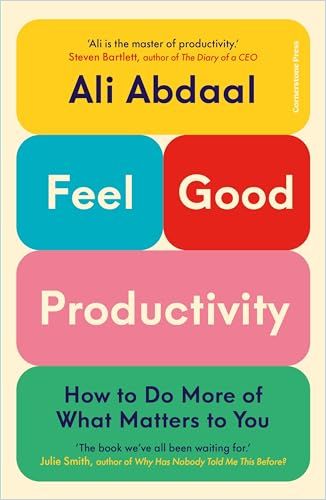Humans are emotional creatures — even when they’re working. Productivity expert Ali Abdaal argues that emotions are a source of energy and part of a cycle that fuels motivation and achievement.

Strong Feelings
In 2018, Ali Abdaal was working as a junior doctor in the UK’s National Health Service while also running a popular YouTube channel to help people pass the entrance exams for medical school. When he found himself teetering on the brink of burnout, he began researching ways to work more sustainably, without sacrificing his productivity. His studies revealed a positive correlation between productivity and emotional well-being. This epiphany led Abdaal to develop his “feel-good productivity” framework.
Since then, Abdaal has become something of a productivity guru, teaching millions how to get energized, overcome procrastination, and avoid burnout. He has interviewed more than one hundred entrepreneurs on his podcast, Deep Dive with Ali Abdaal, and his YouTube channel has nearly six million subscribers.
Well-Being Works
In Feel-Good Productivity, Abdaal explains why you should incorporate moments of joy and play into your work: They drive success and productivity — and they feel good, too.
If you want to maximize your productivity, Abdaal says, don’t simply resolve to do more. Instead, prioritize your emotional well-being. Let your emotions be the fuel that allows you to achieve your goals and flourish. Abdaal cites a 2005 meta-analysis of 225 research papers, which indicates that positive emotions toward work can boost career success. When you feel good, Abdaal says, your body releases four mood-altering, productivity-enhancing hormones — serotonin, dopamine, endorphins, and oxytocin — which boost your energy, elevate your mood, sharpen your focus and motivation, and reduce stress. This enhanced sense of well-being, in turn, leads to better performance reviews, stronger problem-solving skills, and improved strategic thinking.
Power Play
Abdaal’s feel-good productivity framework centers on play. Abdaal notes that, while children readily engage in play, by adulthood, people often forget to prioritize play. As a result, life, once seemingly full of adventure, becomes dull and predictable. He cites a 2020 study from New York University and the University of Miami showing that people who make room for more “adventurous experiences” — even minor changes to the daily grind — tend to feel a greater sense of joie de vivre and serenity.
Life is stressful. Play makes it fun. If we can integrate the spirit of play into our lives, we’ll feel better — and do more, too.Ali Abdaal
Abdaal gives tips for finding room in your life for more play, without abandoning your responsibilities. Simply ask what your job or task would look like if it were fun, he says. Look for ways to gamify your work. Perhaps you could add music to liven up an otherwise dull task. De-stress, lower the stakes, and remove the seriousness from your work by reframing your failures as invitations to experiment with a different approach.
Power is another critical component in Abdaal’s feel-good productivity framework. But rather than viewing power through a zero-sum lens, in which people accrue power by disempowering others, he recommends thinking in terms of personal empowerment. All people can draw from their own personal wellspring of power, he says, without depleting others’ power. If you find yourself navigating a situation that seems beyond your control, remember that you still have agency: You can’t control the challenges you encounter, but you can control your response to those challenges.
Boost Your Batteries
If you feel depleted of energy, Abdaal suggests two sources that can recharge your batteries. The first source is the people in your life. Scientists use the term “relational energy” to describe the warm feelings and can-do attitude that bubble up internally following a positive interaction with another person. Cultivate more energizing interactions by viewing your peers as comrades rather than competitors. When you embrace a “comrade mindset,” you view success in collective terms. Abdaal also cites research showing that acts of altruism release hormones associated with a positive mood, such as oxytocin. These hormones give you a “helper’s high” that can boost feel-good productivity.
When we feel good, we generate energy, which boosts our productivity. And this productivity leads to feelings of achievement, which make us feel good all over again.Ali Abdaal
Creative pursuits are Abdaal’s second recommended source of energy. Research from San Francisco State University and Illinois State University suggests that creative activities — such as drawing or writing poetry — can help you replenish your energy levels. These activities can build your feelings of competence, autonomy, freedom, and calm — as long as you don’t become overly competitive.
Many people gain energy from being in nature, too, Abdaal notes, so he recommends getting outdoors every day. But sometimes, he says, the most energizing activity is doing nothing at all.
Say No More
Abdaal points out that, counterintuitively, increasing your productivity sometimes requires decreasing your workload. That’s because work can trigger a low mood and lead to burnout. The mood response to work can happen for three reasons, Abdaal says: First, it can occur when you take on too much work and overexert yourself. Second, you might fail to rest and take breaks, depleting your energy. Third, you’ll experience a low mood if your job doesn’t align with your sense of purpose, which makes it difficult to feel joy and meaning.
If you’ve ever felt underwater, you don’t have to settle for staying afloat. You can learn how to swim.Ali Abdaal
To prevent burnout and maximize feel-good productivity, Abdaal recommends being mindful of what you agree to do. Resist the temptation to overcommit yourself so you can focus on what matters most. Get comfortable rejecting requests, and treat breaks as a vital necessity rather than a treat.
Design to Align
Abdaal concludes the book on a more philosophical note: You’ll never experience peak energy and productivity if your work doesn’t align with your vision of a desired future. Abdaal points to the power of aligning with the goals you find most meaningful. He suggests doing an exercise from Bill Burnett and Dave Evans’s book Designing Your Life: Write down where you’ll be in five years if you continue on your current path. Then write down what might happen if you take an alternative path. Finally, envision a “radical path,” in which you don’t have to consider factors such as your finances or others’ opinions. Ask yourself which path would make you happiest. It’s never too late to adjust course and take the road that will lead to living the life you most desire.












